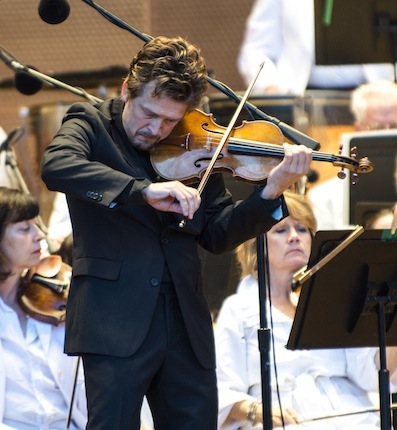Kalmar returns to Grant Park with music of French charm and Spanish fury

Carlos Kalmar is back in town to lead the final three weeks of the Grant Park Music Festival season. Must the summer leave so soon?
Wednesday night’s program was a typically clever lineup with a rarely heard French symphony, a French violin concerto inspired by Spain, and a contemporary Spanish work inspired by the Baroque.
Leave it to Kalmar, Grant Park’s artistic director and principal conductor, to introduce Chicago audiences to the music of Cristobal Halffter, one of the most intriguing European composers of recent decades. The 84-year-old Spaniard’s music often mines forms of the past, infusing them with a decidedly modernist edge. Scored for massive forces, his works are often unbridled in their explosive fury, the uncompromising intensity akin to symphonic heavy metal. Listen to the composer’s own recording of his Versus and see if you’re not served with an eviction notice in the morning.
Halffter’s Tiento del premier tono y Batalla Imperial is not as edgy as most of his works but certainly closed Wednesday’s concert at the Pritzker Pavilion in rambunctious style. Written in 1986 to honor the 80th birthday of his friend, conductor Paul Sacher, Tiento takes musical inspiration from two Spanish Baroque works (which form the title), deftly working Sacher’s name into the score.
Written for Mahler-sized forces, including six horns, Tiento offers a kind of Spanish baroque on steroids. Kalmar led a full-blooded performance that brought out the elegance and martial fervor of the Baroque material while giving full vent to the discordant fury and sonic punch of the Spaniard’s massive climaxes. Perhaps we might hear Halffter’s concerto for violin or piano in a future Grant Park season.
Edouard Lalo’s once-inescapable Symphonie espagnole seems to have been shot out of the canon in recent decades, its showy virtuosity seemingly too frothy for our pessimistic postmodern era. Lalo’s Spanish-flavored work may not be the deepest violin concerto ever written but it is charming and eminently tuneful with ample opportunities for a charismatic soloist.
Symphonie espagnole seems like unlikely repertory for Christian Tetzlaff, an artist who seems most at home in Bach solo works and big serious concertos. While not quite teasing out the Spanish rhythms as enticingly as say, the young Itzhak Perlman, Tetzlaff delivered a polished and bravura performance, aided immensely by the close-knit support of Kalmar and the Grant Park musicians.
The German violinist’s light dance-like touch offered a lean and focused take on Lalo’s Spanish rhythms, which provided a fine foil for the fervent accompaniment of the orchestra under Kalmar. The tick-tock of the finale’s main theme was especially effective with the lightning exchanges between soloist and orchestra in the virtuosic closing moments handled seamlessly by the players. Tetzlaff, a longtime festival favorite, received a well-deserved ovation.
The evening led off with another rarity. Ernest Chausson’s Symphony in B flat. Chausson went through agony writing his only symphony, and it’s not very hard to understand why. The shadow of the Symphony in D minor by his teacher Cesar Franck hangs as heavily over the work as the foreboding threat of more taxes and fees for Chicago residents. Cast in three movements like the Franck, the inspiration is even more manifest in the music’s chromatic style and the contour of its main themes, especially in the framing movements.
Yet Chausson’s symphony is far from negligible, especially when given the kind of advocacy served up by Kalmar and the Grant Park players Wednesday night. Even in the slow introduction, Kalmar invested the music with a drive and conviction that made it seem like a much stronger, more impressive work. The central movement is especially distinctive, and Kalmar and colleagues fully conveyed the dark melancholy, with a fine solo by principal cello Walter Haman.
The final movement seems about to build to a majestic closing climax when Chausson pulls back for a quiet coda (possibly one reason why the work is so rarely performed) yet the glowing final bars felt fully satisfying, capping a notably impassioned performance.
NOTE: Pianist Markus Groh has cancelled his appearances at this weekend’s Grant Park Music Festival concerts due to illness. He will be replaced by Arnaldo Cohen, who will perform Mozart’s Piano Concerto No. 21 in place of the scheduled Bartok Piano Concerto No. 3 The rest of the program will remain unchanged.
Posted in Performances




